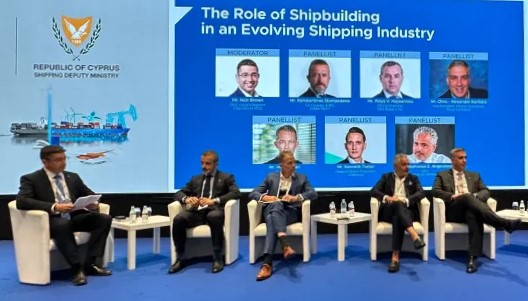Cyprus is preparing legislation that will allow armed guards to board merchant ships to protect the crew, vessel and cargo from pirate attacks.
Details of the new law will be discussed at the “Maritime Cyprus 2011” conference in Limassol that started on Monday where some 700 delegates also debated on trade issues such as energy costs, environment-friendly transport and the freight markets where costs have risen due to piracy and increased insurance.
With the third biggest maritime fleet in the European Union and the tenth biggest in the world, Cyprus also boasts itself as the world leader in shipmanagement companies, all of whom are concerned about the safety of their ships.
The government is at the final stage of concluding the draft bill which, when passed, will make it one of the most comprehensive of its kind and help restore some order in the maritime industry that relies on navies and private security companies for its safety.
“Of the 200-300 piracies that take place every year, only two Cyprus-flag ships were hijacked by pirates and both were released, one of which last week after being held in the eastern Atlantic, off the coast of Nigeria and Benin,” Serghios Serghiou, the Director of the Department of Merchant Shipping, told a press briefing.
“We are in the same situation as all the other maritime nations. We cannot rely on navies to protect ships all around the world,” he said, adding that “even charterers are demanding to have security personnel on board.”
International law is very basic and does little to safeguard crews or prosecute would-be pirates.
Serghiou explained that the new law will overcome past legal obstacles and will help define issues such as the transfer of weapons on board ships and the protection of seamen in cases of conflict.
“This will also send out the message that Cyprus is willing to defend its ships, crew and cargoes,” even though the Republic does not have a navy that would patrol pirate-filled routes in the Indian Ocean or elsewhere. Cyprus does, however, participate in the EUROFOR patrols off the coast of eastern Africa with two naval officers.
“Shipping accounts for 90% of all world trade and is the cheapest method of transport. Piracy is causing major problems to the stability and costs in world trade,” said Thomas Kazakos, chief executive of the Cyprus Shipping Chamber. “Imagine what would happen if global shipping were to come to a halt for three days alone,” he said.
Alecos Michaelides, Acting Permanent Secretary of the Ministry of Communications and Works explained that piracy has also pushed up labour costs. “The industry is having to pay higher wages for seamen in order to make the profession more attractive for new recruits,” he said, adding that the theme of the conference will be “The Questions in shipping – Is it safe enough? Is it Sustainable? Is there enough Confidence?”
The official opening of the conference took place on Sunday evening when the “Cyprus Maritime Awards” were announced. The working part of the conference was held at the “Evagoras Lanitis Centre” in Limassol from Monday to Wednesday. President Demetris Christofias gave a welcoming address to delegates including IMO Secretary General Efthimios Mitropoulos, EU Transport Commissioner Siim Kallas, and 40 other speakers.
The conference also discussed industry issues such as capital markets as a new perspective in ship financing, energy sustainability and the use of energy resources in a manner that would not cause environmental damages, freight market and forecasting, the global financial crisis and the prospects of recovery.
Michaelides added that an afternoon session was due to take place on “Maritime Cyprus: Young Executives” for young professionals under the age of 40 to discuss and analyse current issues of international shipping and to broaden the network of their contacts.

